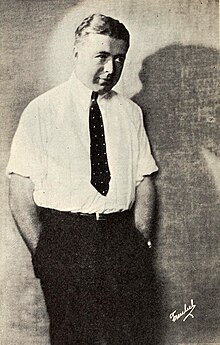Clarence Brown
| Clarence Brown | |
|---|---|

Brown in 1921
|
|
| Born |
Clarence Leon Brown May 10, 1890 Clinton, Massachusetts |
| Died | August 17, 1987 (aged 97) Santa Monica, California |
| Cause of death | Kidney failure |
| Years active | 1915–1953 |
| Spouse(s) | Paul Herndon Pratt (1913-1920; divorce) (1 daughter) Ona Wilson (1922–1927; divorce) Mona Maris (1929-1931; divorce) Alice Joyce (1933–1945; divorce) Marian Spies (1946–1987; his death) |
Clarence Leon Brown (May 10, 1890 – August 17, 1987) was an American film director.
Born in Clinton, Massachusetts, to a cotton manufacturer, Brown moved to Tennessee when he was 11 years old. He attended Knoxville High School and the University of Tennessee, both in Knoxville, Tennessee, graduating from the university at the age of 19 with two degrees in engineering. An early fascination in automobiles led Brown to a job with the Stevens-Duryea Company, then to his own Brown Motor Car Company in Alabama. He later abandoned the car dealership after developing an interest in motion pictures around 1913. He was hired by the Peerless Studio at Fort Lee, New Jersey, and became an assistant to the French-born director Maurice Tourneur.
After serving in World War I, Brown was given his first co-directing credit (with Tourneur) for The Great Redeemer (1920). Later that year, he directed a major portion of The Last of the Mohicans after Tourneur was injured in a fall.
Brown moved to Universal in 1924, and then to MGM, where he stayed until the mid-1950s. At MGM he was one of the main directors of their female stars; he directed Joan Crawford six times and Greta Garbo seven.
He was nominated five times (see below) for the Academy Award as a director and once as a producer, but he never received an Oscar. However, he won Best Foreign Film for Anna Karenina, starring Garbo at the 1935 Venice International Film Festival.
...
Wikipedia
